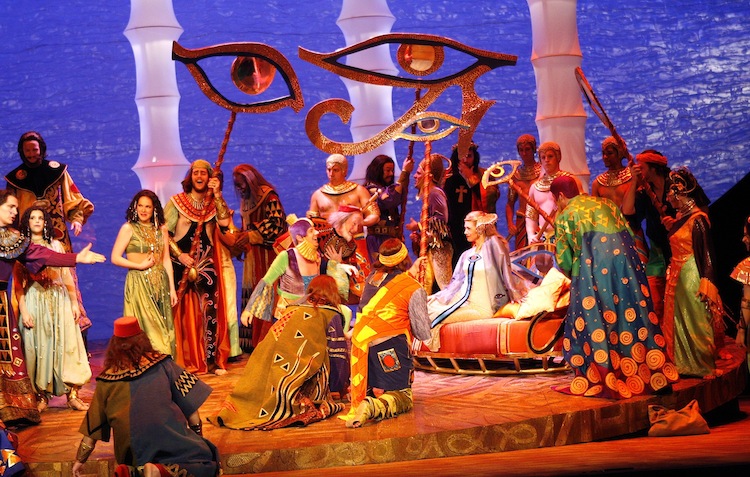FGO readies a sex-and-sand season finale with Massenet’s “Thaïs”

Eglise Gutierrez will sing the title role in Florida Grand Opera’s production of Massenet’s “Thaïs.”
Contrasts play an important role in many of Jules Massenet’s operas, in one form or another. Werther sees the passionate and idealistic title poet in relentless pursuit of a sober young woman bound to reality by her sense of duty. In Manon a provincial ingénue is driven to ruin by the corrupting thrills of fast-paced city life.
But none features so great a confrontation of opposites as Thaïs. Based on Anatole France’s 1890 novel of the same name, Massenet’s 1894 opera follows the desert-dwelling monk Athanaël on his quest to reform Egypt’s most celebrated courtesan. Their clash of ideas is written into the music, says Ramon Tebar, who will conduct Thaïs, which opens May 3 at Florida Grand Opera.
“In the first scene with the monks everything is calm, very cold, and then all of a sudden we are in Alexandria with all this voluptuous passion, this temptation,” Tebar said in a phone interview.
The Spanish conductor believes it is Massenet’s unique combination of these musical ideas that makes the score of Thaïs so remarkable. “The mix that Massenet makes in this score, between the religiousness of Athanaël and the seduction, eroticism of Thaïs—the characters are always struggling with this,” he said.
“I think that the exotic color of this music puts it apart from the rest of his operas. He gave this impressionistic flavor to Thaïs and there are a couple of moments that you really could even think ‘Ravel’ or ‘Debussy.’”
In some ways, Tebar believes, the plot is difficult for modern audiences, which explains why Thaïs doesn’t enjoy a more prominent place in the operatic repertoire. “Everyone has heard the tunes, like the famous ‘Meditation,’ but very few people have seen the opera onstage,” Tebar said. “The plot didn’t help to put this among the repertory operas. It’s not very often played, but the music itself is astonishing—the exoticism, the color, the flavor that Massenet gave to the score.”
In the eyes of the production team, however, there is still plenty for audiences to relate to. Directed by Renaud Doucet, FGO’s production was created at the Opera Theatre of Saint Louis in 2003, and aims for a modern understanding of a work steeped in traditional religious ideas.
“It speaks to today’s audience very much,” said André Barbe, the set and costume designer. “I think it’s about the quest for a certain shape or form of spirituality that is very apparent in discussions we have with people all around us,”
“Although in the opera it’s speaking about religion we feel it’s speaking about the answers that we all are longing for when we live. ‘Is my life only about buying things and working endlessly without knowing what is the final goal?’ These are the questions that Thaïs asks herself.”
Inspired by the text of the aria “Dis-moi que je suis belle,” Doucet and Barbe use eyes and mirrors to communicate Thaïs’s wish to remain beautiful forever and her obsession with how she is perceived. During the “Meditation” scene, as she lets go of her worldly desires and turns toward religion, the eyes that have been watching her for the entire opera evaporate and are replaced by the lone eye of God.
For Doucet and Barbe, the concept of the piece is more important than a strict adherence to its literal setting. “We’re doing it in Egypt, but it’s not a naturalistic or a realistic setting,” Barbe said. “It’s much more psychological than realistic, in a way.”
For his part, Tebar finds the distillation effective. “I find this a very beautiful production, even if it’s kind of minimalist,” he said. “With very few things, I think André and Renaud have achieved a bigger effect than having big scenery, because this way the public can really concentrate on what happens onstage. It’s not a meaty plot,” he said. “But this production helps you to concentrate on the core—on the essence of what it is.”
Miami favorite Eglise Gutiérrez will be portraying the title heroine for the first time. “It is a challenge,” said the Cuban-American soprano. “I’m talking about as an actress, I’m talking about vocally, musically. I believe it is the most challenging role of my whole career.”
Gutiérrez has worked with Doucet in the past on the company’s Lucia di Lammermoor. “He’s very strict,” she said of the French director. “He’s very serious in his job. It’s a big lesson, because you grow up as an artist when you work with him. He makes you very disciplined and very focused.”
She has also been thrilled to hear the vast difference in the quality of FGO’s orchestra since Tebar took over three years ago. “Today we had a rehearsal in the theater, and I thought, ‘Oh my God, this orchestra, it sounds so amazing!’ What Ramon is doing with the orchestra is so beautiful.”
For his star soprano Tebar had nothing but glowing praise. “What can I say about her? She has a very rare quality in her voice, it has a velvety sound, it’s so expressive, she has a wonderful legato.
“She’s also a wonderful actress,” he said. “And with the charm that she has, her phrasing, she’s going to be a wonderful Thaïs.”
Florida Grand Opera’s production of Massenet’s Thaïs starring Eglise Gutierrez, Kristopher Irmiter and Martin Nusspaumer will play at the Arsht Center’s Ziff Ballet Opera House in Miami on May 3, 4, 6, and 10, and at the Broward Center in Fort Lauderdale on May 15 and 17. Angela Mortellaro will sing the title role May 4 and 10. fgo.org; 800-741-1010.
Eric C. Simpson is the Hilton Kramer Fellow in Criticism at The New Criterion
Posted in Uncategorized
Leave a Comment
Thu Apr 24, 2014
at 2:38 pm
No Comments





